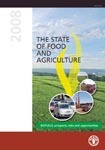7 October 2008: The 2008 edition of the UN Food and Agriculture Organization (FAO) State of the World’s Food and Agriculture Report focuses on the prospects, risks and opportunities for biofuels.
The report addresses key questions relating to the benefits and impacts of biofuel production and use, including impacts on food security, land and water […]
 7 October 2008: The 2008 edition of the UN Food and Agriculture Organization (FAO) State of the World’s Food and Agriculture Report focuses on the prospects, risks and opportunities for biofuels. The report addresses key questions relating to the benefits and impacts of biofuel production and use, including impacts on food security, land and water resources, as well as contributions to greenhouse gas (GHG) reduction and agricultural development.
7 October 2008: The 2008 edition of the UN Food and Agriculture Organization (FAO) State of the World’s Food and Agriculture Report focuses on the prospects, risks and opportunities for biofuels. The report addresses key questions relating to the benefits and impacts of biofuel production and use, including impacts on food security, land and water resources, as well as contributions to greenhouse gas (GHG) reduction and agricultural development.
Speaking at the report’s launch, FAO Director-General Jacques Diouf said biofuels “have been pointed to as one of the main culprits” of the surge in food prices that have threatened the food security of millions of people around the world. He explained that the expansion of biofuel production has been driven by the expectation that biofuels contribute to climate change mitigation while providing support to agricultural producers, but that current policies are increasingly questioned because of concerns about food security and environmental impacts. Noting that biofuel impacts depend on national conditions and policies, he outlined the challenges of sustainable biofuel production and use: preserving food security; promoting agricultural and rural development; ensuring benefits for the poor; managing land, water and biodiversity sustainably; ensuring a positive carbon balance; and accelerating the transition towards second generation biofuel technologies. The report assumes that biofuel demand will affect food prices for the coming decade or longer. While higher food prices threaten the food security of poor households in developing countries, they could offer an opportunity for agricultural development if they are accompanied by increased investments in research, institutions and infrastructure as well as sound policies. It also points to the need to harmonize approaches towards assessing greenhouse gas balances and other impacts and calls for investments in research and development of second generation biofuels. The report stresses that blending mandates and subsidies have resulted in a rush on biofuels in advance of actual knowledge about their effects and impacts, and calls for their revision and additional policy action in order to ensure they are produced in an environmentally and socially sustainable manner. [FAO press release] [Statement by Jacques Diouf] [State of the World’s Food and Agriculture Report]